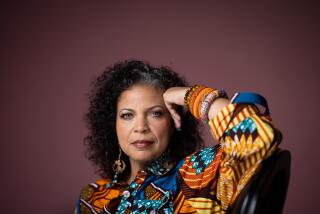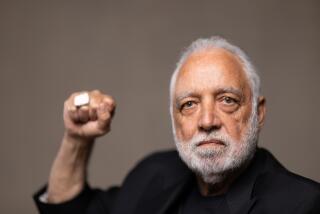Perspectives on Malcolm X : The Media Miss the Real Message : The warm and fuzzy version of this totemic prophet blunts a forceful message that L.A. needs to hear.
- Share via
In the past few months, I’ve watched with irritation as the mainstream media refashioned Malcolm X to be more palatable to the general public. The potency of the totemic Malcolm--brow furrowed, finger pointed, like an Old Testament prophet--has been greatly compromised by the retrofitting. One wonders what he would think of the breathless pronouncements that pour through the television pell-mell.
Recently, one reporter blithely told her listeners that Malcolm X returned from his pilgrimage to Mecca “an integrationist.” That was wishful thinking. He did meet white Muslims and discover that true Islam embraces all believers, without regard to color, but he felt that progressive whites and blacks should work on parallel tracks to erase racism, and once that was accomplished, perhaps there could be joint interaction. “In our mutual sincerity,” he told his biographer, Alex Haley, “we might be able to show a road to the salvation of America’s soul.”
Well-meaning white people, he told Haley, should “combat, actively and directly, the racism in other white people . . . in their own communities.”
The media’s cafeteria approach to the canonization of Malcolm X--choosing only opinions that are to our liking and/or further our purpose--has me more than a little annoyed. Creating a warm and fuzzy version of the slain activist might make many people more comfortable, but it does nothing to focus on the weaknesses in American society that Malcolm pointed out nearly three decades ago. Many of his contemporaries deplored Malcolm’s nationalist sentiments, but today they make a lot of sense--especially in light of last spring’s unrest.
His tenet of black economic empowerment, for example, is one that even very conservative black folks are now preaching. A newly organized Crenshaw coalition is composed of residents, business people and civic leaders. Their objective: to pour black dollars back into Los Angeles’ largest black community as proof that economic self-sufficiency is possible. “We cannot wait for Rebuild L.A. or anyone else to do this for us,” a black banker said. “If we don’t, why would anyone else want to?”
Malcolm’s insistence that the police exist to serve the community, not vice versa, has gained significant popularity even beyond the black community. The groundswell supporting community policing and the gradual development of a force more representative of this city’s diversity is testimony to the prescience of his vision.
He would have recognized that the current tensions between the African-American and Latino communities in Los Angeles are a result of focusing on the wrong thing. Rather than fighting over a small slice of the city’s economic pie, the two communities need to come together to reapportion the slices more fairly. Or, better yet, bake a different pie from another recipe.
“Sometimes,” Malcolm told Haley, “I have dared to dream to myself that one day, history may even say that my voice . . . helped to save America from a grave, possibly even a fatal catastrophe.” Perhaps it may--but first we’d all have to truly listen to it.
More to Read
Sign up for Essential California
The most important California stories and recommendations in your inbox every morning.
You may occasionally receive promotional content from the Los Angeles Times.










